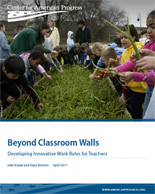 Full Report [pdf]
Full Report [pdf]
The job of “teacher” in most schools today remains centered on full-time classroom responsibilities that are defined by the location, timing, and schedule of the school day and a one-teacher-per-classroom model. But particularly in today’s budget climate, interest in quality-focused job redesigns is increasing among forward-thinking state, district, and charter school leaders. In this report, prepared by Julie Kowal and Dana Brinson for the Center for American Progress, we profile two organizations—the Rocketship Education network of charter schools and the Fairfax County, VA school district— that have redesigned the job of teacher to provide new types of leadership opportunities and let great teachers reach larger numbers of students. A brief presentation, prepared for the Joyce Foundation, outlines key findings.
Experiences in these case study sites suggest that as they pursue similar changes to teachers’ traditional roles, other districts, schools, and charter school leaders can build on early innovations by:
- Extending teachers’ reach beyond traditional classroom boundaries, through redesigns of both organizational structures and job responsibilities that enable great teachers to directly or indirectly reach larger number of students beyond their classroom walls;
- Considering teachers’ individual strengths and weaknesses, as well as their overall effectiveness in improving student learning, when conceiving and designing new work roles;
- Designing roles with both students’ and teachers’ interests in mind, including a clear path between new roles for teachers and the student learning gains they want to achieve;
- Ensuring long-term financial sustainability for what is too often an add-on program by keeping costs in mind from the start; and
- Challenging traditional expectations by embarking on a campaign with teachers, administrators, and other stakeholders to demonstrate the benefits of innovative roles for both teachers and students.
Because these new types of work roles are still in the earliest stages, education leaders must also be mindful of internal systems and local and state policies that may hinder successful implementation. These policy and systems considerations include:
- Collective bargaining provisions
- Class size mandates/certification requirements
- Payroll/HR administration
- Technological limitations
The report provides recommendations for each of these design and policy considerations; as well as details about each organization, the impetus for the program, and how teachers’ work roles have changed to inform and improve reform efforts in other districts and schools across the country.
